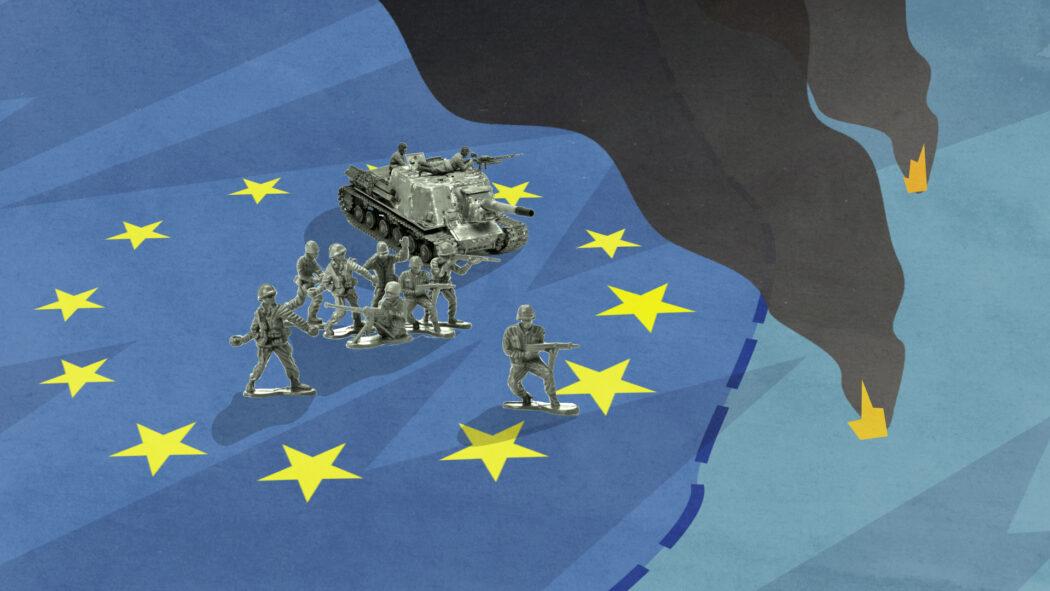Unchecked Power / Military Power Europe
Military Power Europe
Europeans have woken up to a threat of war after several decades of peace and progress for most. This realisation, caused by Russia’s war against Ukraine, is about to fundamentally change the nature of the European Union.
March 2022

The EU has often been referred to as a peace project, and has even been awarded the Nobel peace prize. But now, it’s also being forced to become a military power. How will this paradox play out? Investigate Europe research shows that EU member states have experimented with common defence programs for a long time — with questionable results.
Hundreds of billions of euros will be spent on bolstering European defence in the coming years. But will this money actually make the union safer? How does the EU, along with its institutions, act in military affairs?
The IE team has investigated these questions. After analysing piles of data and interviewing economists, fund managers, military experts, diplomats, arms producers, refugees, European and national officials, IE’s reporters are able to show that the European military policy has been designed primarily to financially support the expansion of the European military industry.
The five big companies that receive the lion’s share of the public funds are based in and owned by just a few European states: France, Germany, Italy and Spain. These huge arms producers are very much intertwined with governments and even competitors. They are also partly owned by the same American funds that control important parts of their American competitors’ shares. All together, this creates a market concentration in the hands of a few industry giants, which, as experts point out, is a competition problem.
Who will control these new EU defence structures and money flows? The European Parliament, the only body directly elected by the EU citizens, is kept out of the most important calls. “We, the European Parliament, are deliberately shut out of these decisions,” criticises Hannah Neumann, a German Greens MEP who is in the Subcommittee on Security and Defense. “Most of this happens in secrecy behind closed doors.”
The Ukraine war raises the debate about a common defence policy. Meanwhile, the EU continues to show contradictory foreign policy strategies:
Greece and Turkey have a decades-long diplomatic conflict over the sovereignty of Cyprus and some islands in the Aegean Sea. This “cold war” is responsible for a high tension situation that helps explain Greece’s high defence budget, even during its years of economic crisis. Both Greece and Turkey are NATO countries, and Greece is an EU member state. But France is selling weapons to Greece, while Germany is a top supplier of military equipment to Turkey. The EU arms exports policy in general is undercut by national interests and is full of loopholes.
Even the EU’s longest military mission to stabilise a country abroad — Mali — has clearly failed. Not only are European forces pulling out from the country after the French ambassador was expelled. EU member states also supplied arms to the Malian forces and might now be unable to control what happens to them and how they are used. Mali’s military government seems also to have brought in Russian mercenaries.
And a European army? So far, only the German government calls this a “long-term goal”. To some extent European military units already exist. The so-called Battle Groups, each consisting of around 1,500 troops, have been operational since 2007. They are special rapid reaction forces put together by personnel from several countries, and tasked with preventing and managing crises outside the EU. At any given time, two battle groups are on stand-by, on six-month rotations. They are supposed to be able to spring into action on five to 10 days’ notice. But the battle groups have never been used, because of disputes over funding, and because member states have not agreed on how and when to use them.
In fact, when Investigate Europe tried to arrange a visit to a battle group that is on stand-by in Italy, there was no response. In the end, an army representative explained to our reporter that they had to find out what the EU battle group actually was.
So, while Vladimir Putin is doing more for European military unity than what decades of EU initiatives have achieved thus far, there is still a long way to go until we have a European common defence. And an even longer wait to create transparent and democratic control structures of an armed Europe.
More from Military Power
Discover more

Help bringour cross-border journalism to life.Support Investigate EuropeDonate
Publications

Países de la UE exportaron armas a Rusia después del embargo de 2014
infoLibre, Spain
31 December 2022

EU-trained soldiers responsible for deaths of civilians in Mali
OpenDemocracy, UK
9 May 2022

Once claves sobre la creciente militarización de la UE
infoLibre, Spain
2 April 2022

Los países de la UE rechazan menos del 1% de las solicitudes para exportar armas
infoLibre, Spain
2 April 2022

La lucha contra el comercio de armas con Arabia Saudí en los puertos europeos
infoLibre, Spain
1 April 2022

Putin samler EU militært
Klassekampen, Norway
30 March 2022

EU-våpen får luft under vingene
Klassekampen, Norway
29 March 2022

Mit tett eddig Európa azért, hogy képes legyen magát megvédeni?
Telex, Hungary
28 March 2022

El Fondo de Apoyo a la Paz: un arma sin garantías en manos de la UE
infoLibre, Spain
28 March 2022

Un pequeño grupo de empresas se beneficia de la mayor parte del dinero que la UE destina a defensa
infoLibre, Spain
28 March 2022

Europejska siła, czyli projekt o prędkości lodowca. “Kiedy nie ma sprzętu, dyskusja jest nieco jałowa”
Gazeta Wyborcza, Poland
28 March 2022

Wojna o pokój
Frontstory, Poland
27 March 2022

Genova, Amburgo e gli altri. Tutti i porti delle tratte armate
Il Fatto Quotidiano, Italy
27 March 2022

Il “Peace fund” che esporta armi. L’esperienza non insegna nulla
Il Fatto Quotidiano, Italy
27 March 2022

Eurodroni sempre più strategici, ma il mezzo europeo sarà pronto nel 2029
Il Fatto Quotidiano, Italy
27 March 2022

La Difesa comune Ue non c’è, il regalo per le lobby invece sì
Il Fatto Quotidiano, Italy
27 March 2022

Vom Friedensprojekt zur Militärmacht:Europa rüstet auf – der große Report
Der Tagesspiegel, Germany
27 March 2022

O poder militar da UE mede-se em euros, mais do que em tropas
Público, Portugal
26 March 2022

Δέκα χώρες της Ε.Ε. πουλούσαν όπλα στη Ρωσία παρά το εμπάργκο του 2014
EfSyn, Greece
20 March 2022

346 Millionen trotz Embargo: Europas dubiose Waffenlieferungen an Putin
Der Tagesspiegel, Germany
18 March 2022

Embargo a chi? Per anni armi “proibite” alla Russia
Il Fatto Quotidiano, Italy
16 March 2022

Dix États européens ont exporté des armes vers la Russie après l’embargo de 2014
Mediapart, France
16 March 2022

Sankcje dziurawe jak sito
Frontstory, Poland
16 March 2022

Dez países da UE exportaram armas para a Rússia depois do embargo de 2014
Público, Portugal
16 March 2022

De proyecto de paz a potencia militar: la UE ya destina desde 2017 miles de millones a su rearme
infoLibre, Spain
27 March 2021



